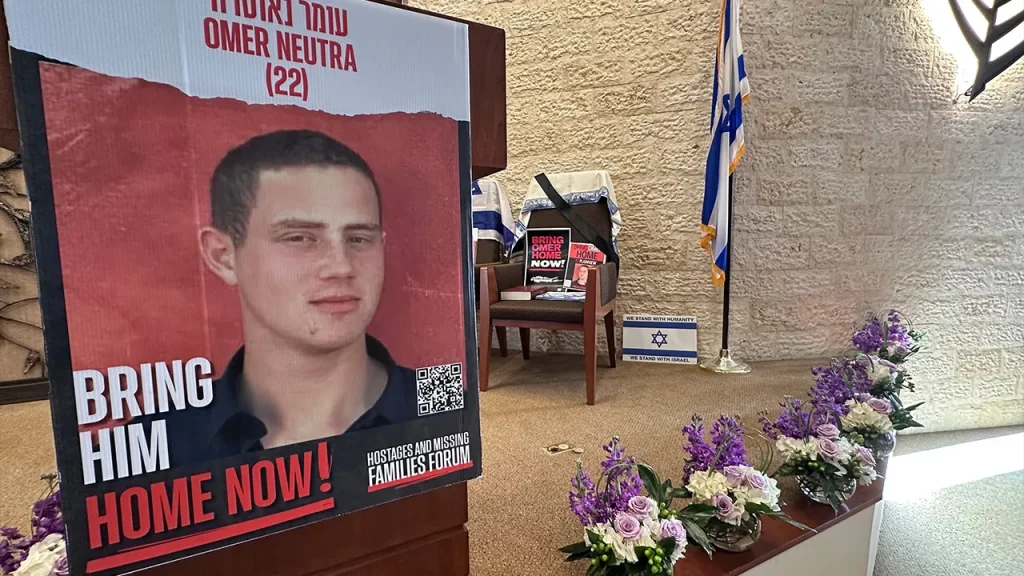The Return of Omer Neutra: A Solemn Homecoming Amid Ongoing Hostage Crisis
In a somber development that highlights the human cost of the ongoing conflict in Gaza, President Donald Trump confirmed Sunday that the body of Omer Neutra, a U.S. citizen who had joined the Israeli army, has been returned by Hamas along with two other deceased hostages. Speaking to reporters aboard Air Force One as he returned to Washington from Florida, the president described the mixed emotions surrounding the recovery. “We got Neutra, from New York, from the United States and I spoke to his parents,” Trump said. “They’re thrilled in one sense, but in another sense, obviously, not too great.” This poignant observation captures the complex feelings of families who finally receive closure but must simultaneously confront the devastating reality of their loved ones’ deaths. Neutra’s journey reflects the deep connections between American citizens and Israel—after spending a gap year in Israel in 2020, he chose to join the Israeli army following his studies at Binghamton University, ultimately becoming one of the many victims caught in this protracted conflict.
The return process unfolded with careful protocol, reflecting the gravity of the situation. Prime Minister Benjamin Netanyahu’s office announced that Israel had received the remains through the Red Cross after they were recovered by IDF and Shin Bet forces inside Gaza. The bodies were treated with dignity, transferred to Israel for a military ceremony led by the Chief Military Rabbi before being taken to the National Center of Forensic Medicine for formal identification. Throughout this process, Israeli officials maintained communication with the families of the deceased hostages, extending deep condolences while emphasizing their continued commitment to bringing all remaining hostages home. The government’s statement reflected both the personal tragedy and the national resolve: “Our hearts are with them at this difficult time,” while pledging that efforts to recover hostages “will continue relentlessly and will not cease until the last hostage is brought home.” This delicate balancing act—honoring the dead while remembering those still captive—underscores the emotional complexity facing both the affected families and Israeli society as a whole.
The return of these three hostages’ remains marks a significant but incomplete step in the broader hostage situation. Though Hamas has now returned 17 deceased hostages since the ceasefire began on October 10, eleven other hostage bodies are still believed to be in Gaza. The process has not been without complications—Israel has criticized Hamas for the slow pace of returning deceased hostages, while Hamas claims they are working as quickly as possible under difficult conditions. These exchanges have become part of the ceasefire agreement, with Hamas agreeing to hand over the remains of 28 dead hostages in exchange for the bodies of 360 Palestinian militants killed during the Gaza war. Each exchange represents both a diplomatic achievement and a painful reminder of the human toll this conflict continues to exact on all sides, with families left waiting in agonizing uncertainty until their loved ones’ remains are identified and returned.
Meanwhile, the broader conflict continues despite these limited humanitarian exchanges. Shortly before Sunday’s hostage release, Israeli airstrikes reportedly hit Gaza, resulting in at least one casualty. The Israeli army stated that its aircraft had struck a militant who posed a threat to its forces, while Al-Ahli Hospital reported that one man had been killed in the airstrike in Gaza City. Prime Minister Netanyahu reinforced Israel’s military stance during a broadcast, stating, “There are still Hamas pockets in the areas under our control in Gaza, and we are systematically eliminating them.” This ongoing military action, occurring alongside negotiations for hostage returns, illustrates the complicated nature of a conflict where humanitarian concerns and military objectives continuously intersect, creating an environment where progress on one front often coincides with setbacks on another.
The story of Omer Neutra brings a distinctly American dimension to this international crisis. As a U.S. citizen who chose to serve in the Israeli military, his death and the subsequent return of his remains highlight the transnational impact of the conflict. President Trump’s personal engagement with Neutra’s parents demonstrates the significance the United States places on recovering its citizens, even as it navigates the complex diplomatic landscape of Middle Eastern politics. For Neutra’s family, the return of their son’s remains represents a bittersweet conclusion to their ordeal—providing the closure of knowing his fate while confirming their worst fears. Their experience stands as a poignant reminder that behind the political negotiations and military operations are individual human stories of loss, grief, and the search for closure in circumstances that no family should have to endure.
As Israel continues its efforts to recover all hostages, both living and deceased, the process remains fraught with challenges and emotions. The Israeli government has urged the public to respect the privacy of the affected families and to avoid spreading unverified information about hostage identities or recoveries. This call for discretion acknowledges the deeply personal nature of these tragedies amid a conflict that often becomes reduced to statistics and strategic calculations. The return of Omer Neutra and the two other hostages represents both an end and a continuation—the conclusion of these individuals’ stories but an ongoing reminder of those still unaccounted for. As families grieve and nations negotiate, the ultimate human cost of this conflict continues to unfold, with each returned hostage representing both a small victory and a stark reminder of the price paid by individuals caught in the crossfire of a seemingly intractable conflict. The challenge remains not only to recover all hostages but also to find a path forward that might prevent such losses in the future.













